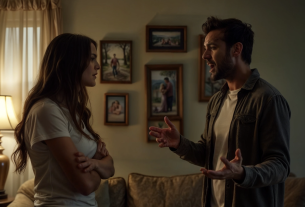“Hi, Olenka! Listen, I’ve got something to ask you… not just a favor, a huge favor!” Marina’s voice, her sister-in-law, rang in the receiver with that affected enthusiasm Olya had learned to recognize as the prelude to something burdensome.
“Hi, Marina. I’m listening,” Olya replied, pushing away a stack of archival folders with yellowed pages. The smell of old paper and dust was her usual working atmosphere.
“You’re going to the sea soon, right? To that… resort of yours?” Marina rattled on. “You’re going alone, if I remember correctly?”
“Alone,” Olya confirmed, and a chill of bad foreboding ran down her spine. She had waited for this vacation for so long. Not just waited—she had earned it with pain, setting aside every penny from her librarian’s salary at the regional archive, denying herself little things. Two weeks of silence, salty air and the absence of anyone’s demands—that was her dream, her personal Everest she’d been climbing all year.
“Olya, listen, take my two with you! Pashka and Lenka. Please? It would be so good for them! The doctors say the sea is the best thing for immunity. And Vit’ka and I just can’t make it this year, you know how swamped he is at work, and I can’t handle them alone,” Marina blurted out in one breath.
Olya fell silent, staring out the window at the gray wall of the neighboring building. She pictured this “vacation.” The constant cries: “Mom, I mean, Aunt Olya, buy this!”, “Pashka threw sand on me!”, “I don’t want this porridge!”, “When are we going to the rides?” Instead of the sound of the waves—squeals and arguments. Instead of reading a book on a lounge chair—keeping watch over two untamed forces of nature in the water. Instead of quiet dinners—trying to feed two picky little creatures.
“No,” she said quietly, but firmly.
“What do you mean, ‘no’?” Marina’s voice sharpened with bewilderment. “Olya, you didn’t understand. I’m not asking you to pay for them! We’ll pay for everything—the packages, and give them pocket money. You just need to keep an eye on them. You’re going alone anyway, you’ll be bored! And with them it’ll be fun!”
“Fun,” Olya repeated silently. That word, in Marina’s usage, meant chaos, destruction and the complete loss of personal space.
“Marina, I’m going on vacation. Alone. I want to be alone. So I’m not taking the kids.”
A deafening silence hung in the receiver. Olya could almost physically feel the emotions changing on Marina’s face on the other end: from bewilderment to hurt, and then—to righteous anger.
“So… you’re just refusing your own niece and nephew? Your own family?” Marina’s voice trembled. “I thought we were close. I come to you with all my heart, asking for help, and you… I’m not sending them to the end of the world! Olya, do you even hear yourself? This is pure selfishness! You don’t have kids of your own, you don’t understand what it’s like!”
That last phrase was a low blow, a familiar one, but no less painful for that. Yes, she and Igor, Marina’s brother, had no children. Years of trying, doctors, hopes and disappointments had burned a huge hole in Olya’s soul, which she’d learned to cover with calmness and work. And her husband’s family, especially Marina and her mother-in-law, made a point of poking that sore spot with enviable regularity, as if checking whether it had healed.
“Marina, my decision won’t change. I’m going to the sea alone, and I don’t need your children pushed onto me. Sorry, I have a lot of work.” Olya pressed the hang-up button, not waiting for a new wave of accusations.
Her heart was pounding. Her hands were trembling slightly. She took a few deep breaths, trying to calm the storm inside. She knew this was only the beginning. The phone call was just the first salvo in the war that had just been declared on her.
In the evening, when Igor came home from work, Olya already knew he’d been informed. He walked into the kitchen looking like he carried the weight of the world on his shoulders. Igor worked as an engineer at a factory, a solid, calm man, but he hated conflicts—especially family ones. He was ready to make any concessions, as long as there was peace and quiet at home.
“Mom called,” he said instead of greeting, sitting down at the table.
Olya silently put a plate of buckwheat and a cutlet in front of him. She didn’t ask what his mother had said. She already knew.
“Olya, maybe you overreacted?” he began cautiously, poking at his food with his fork. “What does it cost you, really? They’re kids… your own family. Marina says they were dreaming about the sea.”
“Igor, we’ve been through this already,” Olya answered wearily, sitting down opposite him. “Remember last New Year’s. ‘Olechka, watch them for an hour, we’ll just go visit someone.’ And where were you two? You came back at four in the morning. While I spent the night breaking up fights between Pashka and Lenka, scrubbing juice out of the carpet and listening to their whining. And the May holidays? ‘Olechka, take them to the dacha, let them get some fresh air.’ And how did that end? A broken apple tree your father planted, and complaints from the neighbors that they trampled all their tulips.”
Igor sat in guilty silence. It was all true. His niece and nephew were very energetic children whose parents—Marina and Viktor—either couldn’t or didn’t want to raise them properly, shifting that responsibility onto anyone nearby. And most of the time that “anyone” turned out to be ever-compliant Aunt Olya.
“But this is a vacation…” he mumbled. “Two weeks. Maybe they’ll be calmer at the sea?”
“Igor, I saved for this vacation for a year. A year! I want to lie on the beach and listen to the sea, not screams. I want to sleep till noon, not jump up at seven to take someone to breakfast. I want to go on an excursion to the mountains, not to the dolphinarium for the tenth time. This is my vacation. Mine. Not mine and your niece and nephew’s. Why can’t anyone understand that?”
“Mom says you’re breaking away from the family,” Igor sighed. “That since we… well…” he faltered, “then you’re supposed to help those who do have kids.”
Olya felt the dull rage boiling up inside again. Once more that reproach, wrapped in fake concern.
“And does your mom mention why Marina, who has two children, has never once offered to help me?” she asked quietly. “When I had pneumonia, who brought me broth? My colleague, seventy-year-old Anna Lvovna. And where was your warm-hearted sister? She called to ask if I could check Pashka’s homework on Skype because she was ‘too busy’. When our car broke down and we needed money for repairs, who lent it to us? My father. And your brother-in-law Viktor said they ‘have a mortgage and it’s a tough time overall.’ They only remember that we’re family when they need something from me. And I’m tired of it, Igor. Bone-tired.”
She spoke quietly, almost without emotion, but every word was filled with the bitterness that had built up for years. Igor looked up at her. There was no anger in his eyes, only confusion. He loved Olya, but he was also a product of his family, where “give in,” “be understanding,” and “don’t cause trouble” were the main virtues.
“I understand,” he said at last. “You’re right. It’s just… there’s going to be a scandal.”
“Let there be,” Olya cut him off. “I don’t want to keep living so that everyone around me is comfortable—except me.”
The phone on the little table in the hall rang again. Judging by the persistence, it was his mother, Svetlana Ivanovna, moving into full-scale attack. Igor flinched. Olya got up, went over to the phone and simply pulled the cord from the socket.
“Today we’re taking a break from relatives,” she said, returning to the table. “Eat before it gets cold.”
Igor looked at his wife, at her drawn but resolute face, and for the first time in a long while he saw not quiet, compliant Olya, but an unfamiliar, strong woman. And, strangely enough, he liked this woman much more.
The next few days turned into a war of attrition. Marina stopped calling, but began flooding the family group chat with photos of her “poor pale children,” who were “being deprived of summer health-improving sea air.” Realizing that direct calls were being ignored, Svetlana Ivanovna switched to the tactic of in-person visits.
She appeared at their door on Saturday morning, unannounced. In her hand was a net bag with a jar of jam—the constant attribute of her “courtesy visits,” which always ended in a moral beating.
“Olenka, I was just passing by and thought I’d stop in,” she cooed, walking into the apartment. “Igor at work? Good, we two need a woman-to-woman talk.”
Olya silently led her to the kitchen. She knew this conversation was unavoidable.
“I brought you some jam, raspberry, good for colds,” the mother-in-law began, setting the jar on the table. “Since the sea isn’t in your cards, at least you can stock up on vitamins.”
The jab was too obvious to bother reacting to. Olya just put the kettle on.
“Olya, I don’t understand this stubbornness of yours,” Svetlana Ivanovna began without further preamble, smoothly shifting from honeyed to stern. “What kind of pride are you showing off? Marina is your husband’s sister. Her children are your blood, you could say. How can you refuse them such a small thing?”
“To me, it’s not a small thing,” Olya replied calmly, taking cups from the cupboard. “To me, it’s the only vacation in several years that I want to spend in silence.”
“In silence!” the mother-in-law snorted. “What a treasure you’ve found. You have silence in abundance as it is. The whole apartment rings with it. No children, no worries. Just live and enjoy yourself. Other women your age already have grandchildren on their hands, and you turn your nose up at your own niece and nephew. It’s not right, Olya. It’s selfish. God sees everything. He doesn’t give children to women like you because you have no heart.”
Olya froze with the kettle in her hand. The air in the kitchen turned thick and sticky. That last phrase hit her like a punch, knocking the ground from under her feet. It was a level of cruelty beyond all bounds, delivered with the air of a preacher guiding a lost soul back to the righteous path.
She set the kettle down slowly. Turned to face her mother-in-law. Her face was pale, but her eyes were steady and cold.
“Please leave,” she said very softly.
“What?” Svetlana Ivanovna was taken aback, not expecting this reaction. She was used to Olya crying or retreating into herself after her sermons.
“Leave. Get out of my home. Right now.”
“How dare you!” the older woman burst out, her cheeks flushing crimson. “You’re throwing me, your husband’s mother, out of the house?! Why, I—”
“You came into my home and insulted me in the lowest way you could think of,” Olya’s voice grew stronger. “You’ve been hurting me for years, hiding behind ‘concern for the family.’ I tolerated it. But everything has a limit. Mine has been reached. Take your jam and leave. And don’t come here again without an invitation.”
Svetlana Ivanovna stood frozen, mouth open. She stared at Olya as if at a ghost. She had never seen her like this. In her worldview, the quiet, perpetually guilty daughter-in-law simply couldn’t talk this way.
“I’ll tell Igor everything!” she finally managed, snatching up her net bag from the table. “He’ll find out how you treat his mother! We’ll see what he says to you then!”
“Do tell him,” Olya nodded, opening the front door. “Just don’t forget to mention exactly why I asked you to leave. All the best, Svetlana Ivanovna.”
When the door slammed shut behind her mother-in-law, Olya began to shake. She slid down the wall in the hallway and started to cry silently. These weren’t tears of hurt. They were tears of release. She had broken the dam that had been holding back her feelings for many years. And if there was going to be a flood now, so be it. She no longer cared.
Igor came home as dark as a thundercloud. Obviously, the conversation with his mother had taken place and had been stormy. Olya was waiting for him in the kitchen, braced for the worst. She ran different scenarios in her mind: he would demand she apologize, side with his mother, tell her she was destroying the family.
He came in, tossed his keys on the little table and went to the kitchen. Sat down opposite her and sat for a long time in silence, staring at one point.
“Mom says you kicked her out,” he finally said in a dull voice.
“I asked her to leave,” Olya corrected. “After she said that God doesn’t give me children because I don’t have a heart.”
Igor flinched and looked up at her. Pain clouded his eyes.
“She… actually said that?”
“Word for word,” Olya confirmed. “And it wasn’t said in the heat of an argument. It was cold, like a diagnosis. Like a verdict. And you know what’s the scariest part, Igor? I think she really believes it. And Marina believes it. They all think there’s something wrong with me, that I’m defective. And since I haven’t fulfilled my ‘main woman’s function,’ I’m now obligated to service their needs. To be a free nanny, an ATM, a shoulder to cry on. And my own opinion, my own wishes are not supposed to exist.”
She spoke, and the words she hadn’t dared even whisper to herself were spilling out freely. She watched her husband’s face change. Confusion gave way to shame, then to anger. But this anger wasn’t directed at her.
“I’ll talk to them,” he said firmly, clenching his fists. “Tomorrow I’ll go to them. To Mom and to Marina.”
“Don’t, Igor. It won’t change anything. They won’t understand. They’ll just decide I turned you against them.”
“Let them think what they want!” he slapped his palm on the table. “But they don’t have the right to talk to you like that! No one does! I… I should have done this earlier. A long time ago. I’ve been trying to be good for everyone. A good son, a good brother. And in the end I turned out to be a bad husband. Forgive me, Olya.”
He stood up, came over and hugged her. Tightly, as if afraid she would fall apart. And Olya realized that this scandal, this storm she had unleashed, was something he needed too. He needed it to finally wake up and see what was happening to their life, to their family.
The next day Igor really did go to see his relatives. Olya didn’t know what he said there. When he came back, he was exhausted but calm.
“I told them that if they don’t stop, they’ll stop being part of our family,” he reported briefly. “And that you’re going to the sea alone. And that’s not up for discussion.”
The phone was silent. The family chat went quiet too. A deafening, tense silence settled over everything.
A week before her vacation something happened that Olya hadn’t expected. Viktor, Marina’s husband, called. His voice sounded embarrassed and cornered.
“Olya, hi. Sorry to bother you,” he began. “The thing is… we need to talk. With both of you. It’s important.”
They met at a café. Marina sat with a stony face, staring into a cup of cold coffee. Viktor looked awful—pale, with dark circles under his eyes.
“Well,” he began without looking up, “it’s not just about the vacation. In fact, it’s not about it at all. I’ve got problems. Big ones.”
And he told them. Told them how, a few months ago, he’d gotten involved with some shady people, invested a large sum of money into a “super-profitable project” that turned out to be a plain old Ponzi scheme. He’d not only lost all their savings, but had gotten himself into huge debt at high interest. And now these people wanted their money back. With threats.
“Marina wanted to send the kids to you not just for fun,” he went on dully. “We were scared. We are scared for them. We figured at least they’d be safe with you. And the money for their trip… we were going to use what we had left, just to create the illusion that everything’s fine.”
Marina sat motionless. There was none of her usual arrogance on her face—only fear and despair.
“Why didn’t you say anything right away?” Igor asked.
“I was ashamed,” Viktor squeezed out. “I thought I could sort it out myself. I couldn’t. They gave me two weeks. If I don’t pay, they promised… well, you understand.”
Olya looked at them and felt no satisfaction. What she felt was a strange, cold emptiness. This whole sea story, all the manipulation and insults had just been a smoke screen, hiding someone else’s stupidity and lies.
“And how much do you need?” she asked.
Viktor named the sum. Olya was stunned inside. It was three times the cost of her vacation. It was all the money she and Igor had saved “for a rainy day” over several years.
“We’re selling the car,” Marina said quietly, speaking for the first time. “But it won’t be enough. And you can’t sell an apartment that quickly… Olya, Igor… I know I’ve behaved horribly. I’m sorry. But I’m in a panic. I don’t know what to do.”
The four of them sat at a little table in a half-empty café—four people bound by family ties and a shared disaster. Yet Olya felt like a stranger at this feast of despair. Her resentment hadn’t gone anywhere; it was just overshadowed by their larger catastrophe.
That evening she and Igor sat in the kitchen for a long time.
“We have to help them,” Igor said. “She’s my sister. And the kids… it’s not their fault.”
“We don’t have that kind of money,” Olya replied. “Well, technically we do. But it’s everything we have. If we give it to them, we’ll be left with nothing.”
“I know. But what else can we do?”
Olya stared out at the night city through the window. Her vacation, her hard-won sea, her two weeks of silence… all of it suddenly seemed so distant and unimportant against the real danger hanging over her husband’s family. But something inside her resisted. That new, solid core that had been born the day of the showdown with her mother-in-law.
“Igor,” she said slowly, choosing her words, “I understand your wish to help. But let’s look at this soberly. Viktor got into this mess out of stupidity and greed. Marina covered for him and tried to solve the problem at my expense, manipulating and insulting me. If we now give them all our money, what then? They’ll decide this is how it can always be. That we are their life raft, always within reach.”
“So what are you suggesting? That we abandon them?”
“No. Not abandon. But also not fix their entire mess for them.” Olya paused. “They’re selling the car. Good. Let them. Viktor has a garage he inherited from his father. Let him sell that too. Marina has gold jewelry she’s been given on every holiday. Let her take it to the pawnshop. Yes, they’ll lose some comforts. Yes, they’ll have to tighten their belts. But that will be their lesson. A hard one, but fair.”
She spoke, and Igor listened with a deep frown. He could see the logic in her words, but accepting it was hard.
“And if it’s still not enough?” he asked.
“Then,” Olya paused, “then we’ll lend them the remaining amount. Lend, not give. With a written IOU. With a clear repayment schedule. Let it be bit by bit, a thousand a month. But they must pay back every ruble. So they understand the value of money. And the value of their mistakes.”
Igor was silent for a long time, pacing the kitchen back and forth. Then he stopped and looked at his wife.
“And your vacation?” he asked.
“My vacation is happening,” Olya said firmly. “I’m not touching the money I saved for it. That’s not up for discussion. That’s mine. And I’ve earned it.”
Viktor and Marina accepted their conditions. They were crushed and humiliated, but they had no choice. Over the next week they sold everything they could—car, garage, Marina’s jewelry. The amount they raised was substantial, but still not enough. Olya and Igor loaned them the rest, formalizing it with a notary. Marina didn’t lift her eyes while signing the IOU.
The day before her departure, Olya was packing her suitcase. The apartment was quiet. The phone had been silent for two weeks. Her mother-in-law, having learned about her son-in-law’s debts, had taken to her bed with high blood pressure and cut off all communication. Marina was swallowed by her own problems.
When the suitcase was almost packed, the doorbell rang. Marina stood on the threshold. Alone. She looked thinner and worn out.
“I… I’ll just be a minute,” she said, not daring to step inside. “I came to say… thank you. And… I’m sorry. For everything. I was an idiot.”
Olya looked at her, not knowing what to answer. The word “sorry” had been spoken, but something kept her from accepting it. Too much had been said and done. The wound was too deep.
“I hope things work out for you,” Olya said instead. It was a polite but distant phrase. A phrase for a stranger.
Marina nodded.
“Have a good rest,” she said, and then turned and hurried down the stairs.
Olya shut the door. She felt neither joy nor relief. Only bitterness and fatigue. She understood that things would never go back to the way they were. A crack had opened between them that no apology could seal. Her husband’s family, which had always seemed to her like a single, monolithic clan, turned out to be a tangle of contradictions, grudges and selfishness. And she, Olya, no longer wanted to be part of it.
The next day she sat in a train carriage heading south. Fields, forests and small stations slid by outside the window. She took out a book but didn’t open it. She just looked out and thought. Thought about how sometimes, to save yourself, you have to destroy the world around you. Or at least the part of that world that’s suffocating you.
Two days later she sent Igor a photo. An empty beach at dawn, turquoise sea, and her bare feet on wet sand. The caption was short: “It’s quiet here.”
Igor looked at the picture and smiled. He understood that his wife hadn’t just gone on vacation. She’d gone to find herself. And he was sure she would. As for everything else, they’d manage. Together. But now under new rules. Under her rules. And that was only fair



